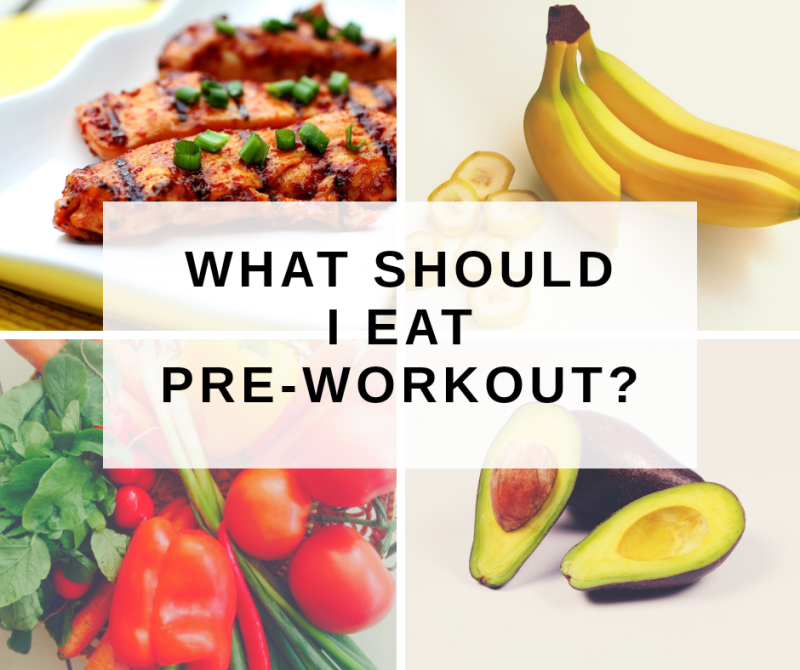Have you ever thought about what you should be eating before and after exercise? The thought may have crossed your mind before and honestly, it is a great question!
It is important that we provide our body with foods that will help supply the energy, strength and endurance needed to make it through our workout.
Depending on your health goals, the combination of carbohydrates, protein and fats may need to be altered to help you achieve your goal. With that being said, the purpose of this blog post is to educate you on the different macronutrients, their purpose and how each can help you power through a workout. (It is not intended as a specific nutrition plan to help you lose or gain weight.)
So as you may already know there are three types of Macronutrients: Carbohydrates (carbs), Protein and Fats.

Carbohydrates (aka Carbs):
- Carbs are the body’s preferred source of energy. They help to fuel workouts and replenish glycogen stores within the muscle and liver. Simply put, glycogen is how the body stores glucose (energy) for later use.
- For example, if you are planning to do a High Intensity Interval Training workout (alternating between periods of high and low intensity exercise) then you would definitely want to make sure you have consumed some good quality carbohydrates. In this case, the body will use glycogen as its main source of energy.
- It is best to select complex carbs that will supply energy and help with recovery. Foods such as whole grains, brown rice, green veggies, and fruits such as bananas and/or mixed berries are great choices.

Protein:
- Protein is necessary to build, repair and maintain muscle tissue. Protein consumption is vital if your goal is to build lean muscle. Protein can also be used as a major source of energy.
- If you are about to complete a strength training workout, then consuming protein prior to your workout session is vital. Strength training places stress on the body and breaks the muscle down. Protein will help to increase strength, promote lean body mass, improve muscle performance and will help to repair the muscle.
- Good sources of protein include chicken, fish, lean red meat, and eggs. You can also use protein powder or protein bars as a source of added protein. Just make sure they don’t contain too many added sugars and check the food label. All protein bars are not healthy!

Fats:
- Fats have many functions in the body including helping the absorption of vitamins A, D, E and K (commonly referred to as fat soluble vitamins), provides insulation, holds certain vital organs in place and protects and them from injury. In regards to exercise, fats are a major fuel source as well.
- If you will be performing long low to moderate intense workouts, then fat will be the main energy source used. If you were running a marathon, your body would first use glycogen stores for energy production and once they are depleted, the body would move to utilizing fats.
- Of course there are both good and bad fats, so you want to stick to healthy fats such as polyunsaturated (PUFAs) and monounsaturated fats (MUFAs). Healthy sources of fats include coconut oil, avocado, cashews, almonds, and olive oil.

Fluids:
- You also want to make sure you are hydrated before, during and after your workout. Your muscles are about 70% water so you need to make sure you are properly hydrated to prevent muscle cramps. Plain Water is usually sufficient but if you are working out in hot, humid weather and are sweating a lot, a sports drink with electrolytes such as sodium and potassium is a good option. These electrolytes are vital in muscle function and can be loss during intense sweating.
So when it comes to what you should eat before working out, it depends on the workout, but in general you want to make sure you are consuming good quality complex carbs, lean protein and healthy fats.
The closer you get to your workout the lighter the meal should be because you don’t want a belly full of food when you are trying to exercise. When digestion is taking place you primarily have blood flow going to the intestines. During exercise, blood flow should be going towards the muscles to supply oxygenated blood for your workout.
If you have less than two hours before your workout try the following carb-protein combinations:
- Smoothie with protein powder, banana and mixed berries.
- Oatmeal and bananas, with cinnamon.
- Whole grain bread with almond butter.
If you only have 15 to 30 minutes before your workout stick with a small snack that is easy to digest:
- Bananas
- Raisins
- Greek Yogurt
Now that you know what foods are beneficial to consume pre-workout, it’s time to slay the gym! After your workout you should consume healthy sources of protein to help with muscle recovery, prevent soreness and build new lean muscle tissue.
Find Health in Every Day,
Dr. Lindsay
Disclaimer: The information on this site is not intended or implied to be a substitute for professional medical advice, diagnosis or treatment. All content, including text, graphics, images and information, contained on or available through this web site is for general information purposes only.


